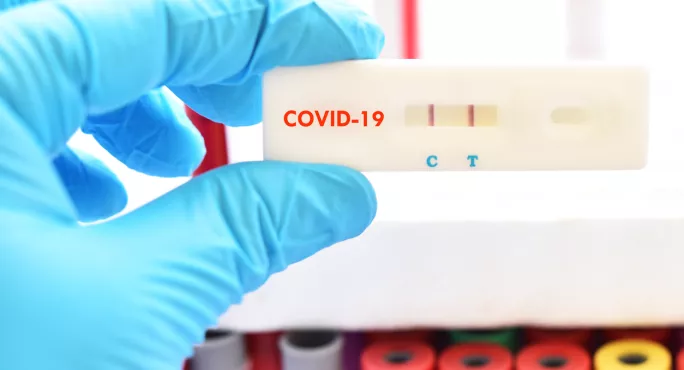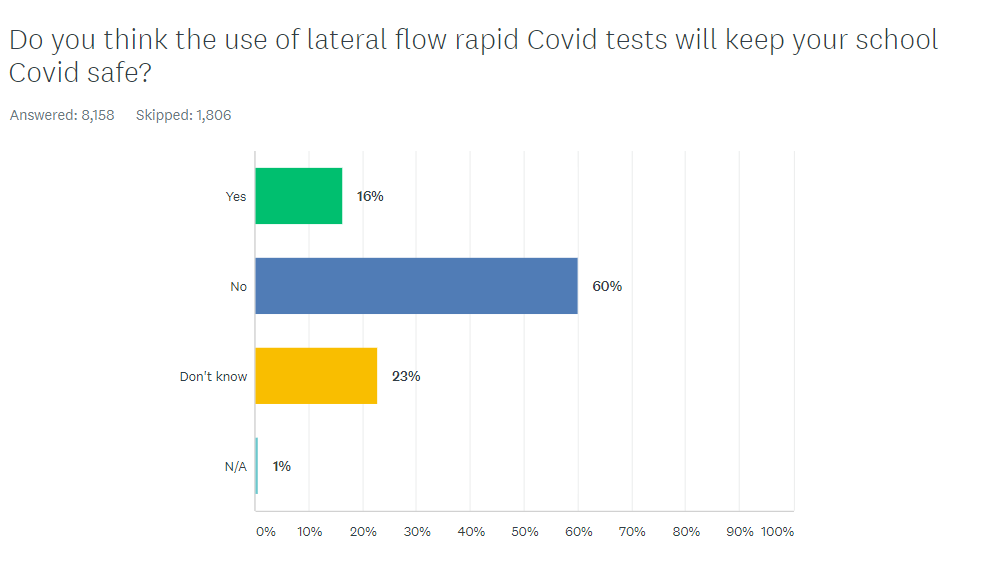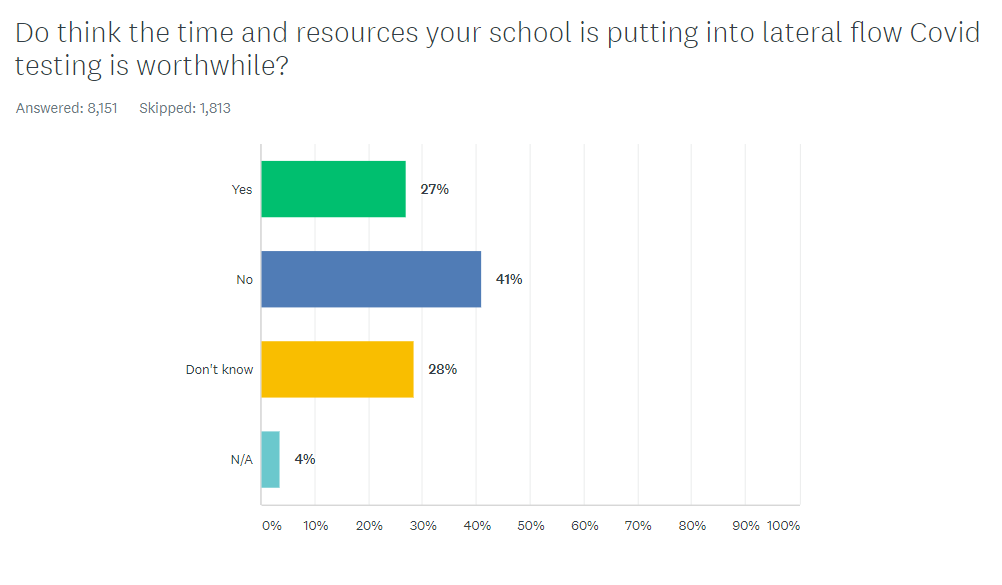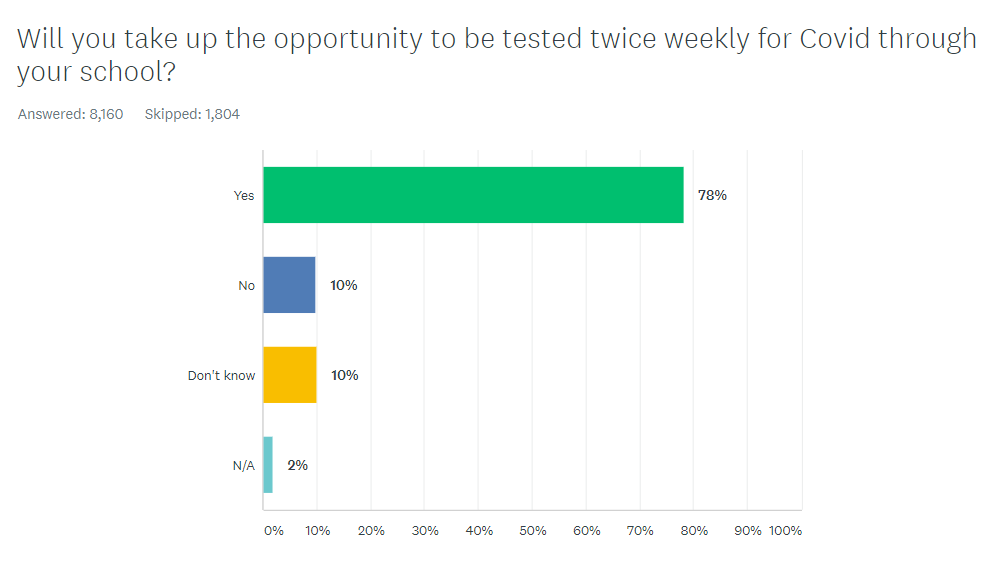Exclusive: School staff lack faith in rapid Covid tests

Less than one-fifth of school staff think rapid Covid tests will keep their school safe, Tes can reveal.
And only 27 per cent say they believe their school’s investment of time and resources in lateral flow testing is “worthwhile”, according to a survey of more than 8,000 school staff in England.
The government has made rapid testing a cornerstone of its approach to reopening schools, with plans to test teachers twice weekly already in force.
Covid: Teachers fear ‘reckless’ full 8 March school openings
Gavin Williamson: Schools should test staff twice a week
Exclusive: Health chiefs warn schools over Covid tests
Earlier this month, the Department for Education revealed that 97 per cent of schools and colleges are now ready to deliver tests to help curb the spread of Covid - and said this would provide “vital reassurance” that the “necessary testing infrastructure” will be in place ahead of wider school reopenings.
But the Tes survey results suggest that most school staff have not been reassured.
The findings, bases on responses between 22 and 26 January, suggest that only a minority of staff have faith in the rapid testing.
Asked if they think the use of lateral flow rapid tests will keep their school Covid-safe, just 16 per cent of staff said “yes”, while 60 per cent said “no”.
Nearly one in five staff (23 per cent) said they were not sure either way.
Of those who said they did not believe the tests made schools safe, many cited concerns with reliability.
One trainee secondary teacher said their school had used the rapid tests during the autumn term and “they did nothing to protect staff”.
Rapid Covid tests: Fears of false results
“One staff member tested positive so we all got tested,” they said.
“We tested negative and continued to work. A few days later, several staff members (who work within the same department as the first positive staff) then tested positive. We falsely believed that we were safe because of the tests.”
Another teacher added: “Lateral flow tests are complete rubbish. My husband works for the government. He rejected these tests for his department months ago.”
Meanwhile, just 27 per cent of staff said they thought the time and resources their school was putting into rapid testing was “worthwhile”.
A further 41 per cent said the lateral flow tests were not worth it, while 28 per cent said they were not sure.
One secondary teacher said: “Too much time is being spent on this when we should be top of the vaccine list.”
And a senior leader at a primary school said: “I think it’s a cheap and ineffective way of trying to force staff and children back to schools before it is safe.”
However, the vast majority of staff said they would take up the opportunity of twice-weekly testing through their school.
More than three-quarters (78 per cent) said they would take the tests, compared with just 10 per cent who said they would not, and a further 10 per cent who said they were not sure.
Last month, before these survey responses were collected, the DfE “paused” its controversial plan to use daily rapid Covid testing to keep close contacts of confirmed cases of the virus in school.
Public Health England (PHE) had recommended putting this part of the government’s Covid school testing plan on hold because of the higher rates of transmission of the virus caused by a new variant.
However, lateral flow testing in schools has continued in some capacity.
Education secretary Gavin Williamson has called on schools to test staff twice a week to help break transmission of Covid-19.
And PHE has said secondary schools should continue to test pupils twice upon their return to school.
It has been suggested that proposals for a wider return currently being considered by ministers involve schools initially testing all pupils, with parents taking on the responsibility using home kits thereafter.
Teachers and school leaders should get some concrete answers when Boris Johnson outlines his “road map” out of lockdown on Monday, including plans for a wider return to school from 8 March.
So far, the government has remained tight-lipped on what this will entail.
Register with Tes and you can read two free articles every month plus you'll have access to our range of award-winning newsletters.
Keep reading with our special offer!
You’ve reached your limit of free articles this month.
- Unlimited access to all Tes magazine content
- Save your favourite articles and gift them to your colleagues
- Exclusive subscriber-only stories
- Over 200,000 archived articles
- Unlimited access to all Tes magazine content
- Save your favourite articles and gift them to your colleagues
- Exclusive subscriber-only stories
- Over 200,000 archived articles






